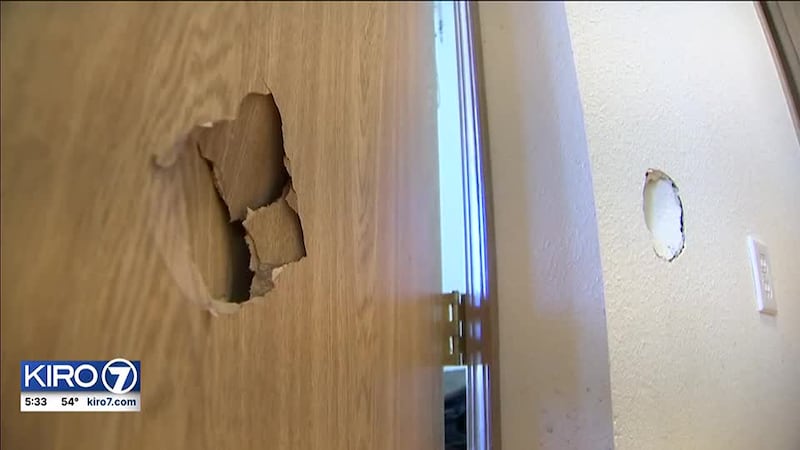PUYALLUP, Wash. — Glen Jasmer is a widower and a reluctant landlord. Dana, Glen’s late wife owned the home when the two got married. After renting it in 2020 it’s become a legal nightmare.
“She recently passed and I’m glad she passed so that she doesn’t have to see what is happening to her pride and joy,” said Jasmer.
The only view he gets of the place is peeking over the fence, which currently resembles a garbage dump.
“They don’t pay their garbage bill, which is mandatory in the city of Puyallup,” he said.
At one point the water was cut off. Now, Neighbors complain of vermin.
“I don’t know how the city can allow this to happen,” said Jasmer.
Through all of this, he’s been attempting to evict his tenants. He claims his total losses are nearing $50,000.
Jasmer told us almost immediately after they moved in, they stopped paying rent.
“They would pay rent, then skip a couple of months, then pay rent again or pay half a month rent or skip a couple of months,” he said.
Jasmer’s case highlights the difficult terrain in the new landscape of landlord-tenant disputes.
First, he said it’s unfair that a free lawyer represented tenants and that he - and all taxpayers - pay for this.
Sean Flynn is the director of the Washington Rental Housing Association.
“Our tax dollars are going to fund a public defense law firm, the Housing Justice Project, that is a not-for-profit organization that provides defense to residents who are facing eviction,” Flynn said. “So, folks who haven’t paid their rent or are not obeying the rules - the state is paying for their defense. If you’re a small housing provider, you can’t afford the process to take longer. And so, the system is broken. And we know what broke it. It’s the lawyers. "
Mark Morzol is the managing attorney for the Tacomaprobono Housing Justice Project. He said his group is not causing delays but rather forcing landlords’ lawyers to follow the letter of the law.
“There are protections built into the law that certain notifications have to be given to tenants, and you have to follow those strictly,” Morzol said. “And I don’t think enforcing that is really a technicality. It’s the way the law is written. So, it isn’t that the defense attorneys are really hindering or delaying this any more than the landlord has certain responsibilities that they have to follow before they get their eviction.”
Over two years, Morzol’s group will receive $1.6 million from the state to fund its 11 attorneys handling Pierce County cases.
“We represent 1410 tenants,” he said. “That’s an average of about $600 per tenant. So, if we’re spending $600 and we are stopping you - when you’re spending thousands of dollars on your attorney.”
Jasmer has spent thousands trying to get his house back - a property he was counting on for his retirement.
“If their lawyer actually wants to help or their group wants to help, they should find a house or apartment that they can actually afford to move into and then help them move,” he said.
Finally, after more than three years and all the damage, the court ruled for Jasmer to regain control of his home. Seeing the extensive damage brought him to tears.
“I Just want to get it over with, and I never want to come back,” he said. “This is the last time I want to be here.”
His home smelled worse than it looked. Trash and damage everywhere, from the floor to the walls. He said what happened is criminal.
“They should be arrested for doing this,” he said. “I’m just so angry right now. It’s. I can’t even put it into words - what they’ve done to this house and my feelings toward them.”
Glen will not be reimbursed for these losses. He estimates it will cost more than $30,000 to get the home back to the shape it was when Dana purchased it.
Now it’s up for sale because nothing will ever be the same here again.
“I don’t know how their lawyer can allow this to happen,” he said. “I don’t know how the judge can allow this to happen. I don’t know how the governor can allow this to happen. They just don’t care.”
Jasmer said he tried to get into the home while the tenants were living there, but they never let him in.
He did receive $36,000 from the state in 2022 to help recover his losses.
But after signing that agreement, Jasmer said the tenants did not follow through with the payment plan.
©2024 Cox Media Group







